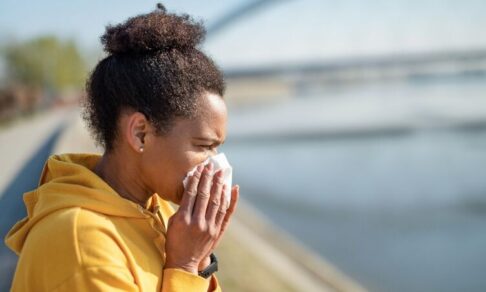More severe hay fever symptoms experienced in urban areas

People living in urban areas experience more severe hay fever symptoms than those in rural areas, according to UK researchers.
In the first study to carefully map hay fever symptoms with air quality, weather and land use, researchers found twice the severity of runny nose, sore eyes and wheezy breathing in urban areas than rural ones.
Between 2016 and 2020, urban areas record significantly higher symptom severity and longer symptom duration for all years except 2017, the researchers said in Scientific Reports.
Related Article: Diagnosis Connect service will link people to advice from charities
It suggests that not only are symptoms worse for those in cities but they last unbroken for longer periods of time, they found.
Data on symptoms was collected through the Britain Breathing app by more than 700 individuals.
The symptom reports were then combined with pollution measurements and pollen and meteorological data taken from the UK Met Office to provide a ‘real-time’ look at hay fever severity and air quality. It also showed that symptom severity was significantly correlated with ozone levels.
One potential reason for 2017 being an exception could be differences in ozone plus it being warmer and wetter than the other years, which may have had an effect, either on pollen counts, pollution or participants’ biological reactions they suggested.
Study author Professor Sheena Cruickshank, an immunologist at the University of Manchester, said the worldwide prevalence of allergic respiratory disease had risen considerably in recent years.
Related Article: Prescribing in England to be led by a single national formulary
‘However, hay fever affects people differently and can change over a lifetime and data is lacking on how environmental factors may influence this.
‘This study provides evidence that urban surroundings may exacerbate hay fever and asthma symptoms.
‘It also provides a broader picture of chronic health issues experienced by hay fever and asthma sufferers, as opposed to only observing those with more acute and/or problematic reactions.
‘These differences in allergy symptoms may be due to variation in the levels of pollutants, pollen counts and seasonality across land-use types.’
Related Article: Advice on Guillain-Barré risk for adult RSV vaccine updated by MHRA
Why people experience worse symptoms in urban areas is complex and may be impacted by many factors, the researchers noted and ‘there may be many aspects of the city environment that have a negative impact on respiratory health’.

See how our symptom tool can help you make better sense of patient presentations
Click here to search a symptom




